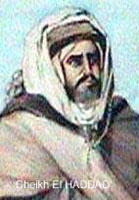In Algeria
The Kabylians, or Kabyles, were the second largest Berber people in Algeria, where the French flag had flown since 1830. Their leader, Kalif Mohamed El Mokrani (1815-1871), was initially loyal to the French authorities, but his loyalty turned into anger when his offer to join the French army and fight against the Prussians in the Franco-German War was completely ignored. He was also angered when the French "forgot" to pay back a loan of 350,000 francs. El Mokrani had lent them this money to buy food for the hungry inhabitants of his land.

El Mokrani, uit Zoom Algérie
The Algerian leaders found the appearance of the new (Third) French Republic as such difficult to bear. After the humiliating defeat of Emperor Napoleon III at the battle of Sedan, the Algerian aristocracy had to treat French civilian authorities with respect, but they were unwilling to acknowledge these civilians as their superiors.
In March, 1871, El Mokrani, his next of kin, and the illustrious sheik El Haddad (1790-1873) led a revolt. French fortifications were beleaguered for a long time. The front expanded from the north to the west and the fortunes of war went back and forth. El Mokrani died in the first stage of war on May 5, 1871, but his brother Boumezrag and other warlords continued the struggle. After many months, 350 military confrontations, and 2600 casualties, the war ended in January, 1872. The trial against El Haddad and the other leaders of the revolt took place in the spring of 1873.

Cheikh El Haddad, uit L'encyclopédie de l'AFN
El Haddad died from disease shortly after the verdict. His two sons, Aziz and Mohamed, his brother Boumezrag El Mokrani, and all the other high officers - the rank and file went free - waited in jails in France to be deported to New Caledonia. Compared to the communards, their punishment was relatively light.
